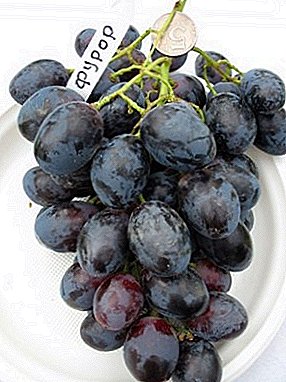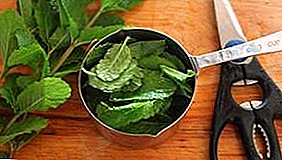
Euphorbia Pallas (Fisher) is also called man root.
This plant possesses a huge range of medicinal propertieswhich people have known since ancient times.
From the very name it becomes clear that this plant can cure a number of male diseasessuch as prostate adenoma and prostatitis.
The medicinal properties of euphorbia pallas (male root) help to fight tuberculosis, bronchitis, anemia and diseases of the gastrointestinal tract.
Also, the plant is used as a healing agent. with burns and injuries. Another property of milkweed Fisher - increase immunity. But it is important to remember that when used incorrectly plant loses its healing effect.
Characteristic
Euphorbia Pallas - pretty rare plantwhich can be found in China, Mongolia, Transbaikalia and Eastern Siberia. Grows mainly on gravelly and stony slopes, less often - in plain steppes.
Euphorbia male root is a perennial plant reaching 40 centimeters in length. It has a long strong meter root. Its pubescent (sometimes bare) stems grow up to 20-50 centimeters and have upper internode 2-6 centimeters long.
Brown scaly leaves are located in the lower part of euphorbia, in the middle - lily, brownish-green, collected in whorls of 2-6 pieces. Yellow flowers of milkweed Fisher collected in large umbrella inflorescence.
Fruit root root looks like oblate thick-walled box with three light brown seeds. All parts of the plant are able to secrete milky sap.
Euphorbia has a huge number of species, and it is very popular in home cultivation: Multifloric, Edged, Cypress, Tirukalli, Ribbed, Mile, Belochylkovy, Triangular.
A photo
Then you can see a photo of euphorbia Pallas:



Chemical composition
It is believed that the composition of this plant is still not fully understood. However, today there are a lot of substances that are part of the euphorbia Pallas.
Among the main components emit alkaloids, flavonoids, glycosides, toxins, tannins, triterpenoids, lactones.In addition, the composition includes more 8% of various pitches. Also euphorbia pallas rich in selenium.
The milky sap of a plant consists of more than half of water and substances capable of dissolving in water. Also included in the juice are tirukallol, eufuron, euphorbic anhydride and taracasterol.
Medical applications
Disease treatment methods
Euphorbia pallas (muzhik root) has gained immense popularity among traditional healers because of its healing properties. There are several methods of treatment of various diseases:
 A decoction of plants used in diseases of the respiratory system.
A decoction of plants used in diseases of the respiratory system.
With the help of milkweed, chronic bronchitis and lymph node tuberculosis can be cured.
Also, the root root decoction helps to cope with inflammatory processes in the oral cavity, rectum and nasopharynx.
Due to the presence in the composition of selenium, extracts from milkweed help fight anemia, as well as restore the blood after antitumor therapies: radiation and chemotherapy.
The upper part of the root is used as an emetic, and the lower as remedy for constipation.
Another property of milkweed is treatment of urolithiasis;
Alcohol tincture of euphorbia pallas (man root) used for diseasesable to weaken the body's erectile function in men. These diseases include prostate adenoma and prostatitis.
Also alcohol tincture helps to strengthen the work of immunity. Euphorbia Pallas is recommended to be used for disorders of the gastrointestinal tract, and some say that the plant helps to lose weight.
This is one of the few plants that with leukemia able to stop the growth of metastases.
Among other properties of the male root is the ability to overcome mastopathy and uterine myoma.
 It is important to remember that spurge Pallas is poisonous planttherefore it is necessary observe the correct dosageso as not to harm the body;
It is important to remember that spurge Pallas is poisonous planttherefore it is necessary observe the correct dosageso as not to harm the body;
Milkweed Pallas Root applied externally. Concrete rubbing is used to cure atopic dermatitis and lupus.
Milky Milkweed Juice destroys warts.
In the presence of boils, abscesses, ulcers and purulent wounds, use pounded into powder root.
Side effects
Due to the fact that euborphine is included, euphorbia (muzhik-root) is a poisonous plant, misuse which can lead to severe consequences.
In case of poisoning Euphorbia pallas begins profuse vomiting and diarrhea, the tongue may swell and burn in the mouth, pain in the stomach and mucous membranes become inflamed.
If the necessary measures are not taken on time, convulsions, loss of consciousness begin to appear, and the work of the heart is also disturbed.Euphorbia poisoning may even lead to death.
In case of poisoning, euphorbia urgently needs call an ambulance, which is necessary before arrival do a gastric lavage with a suspension of activated carbon in 2% sodium bicarbonate solution.
 The patient should drink large amounts of cold milk and mucous drinks (for example, jelly).
The patient should drink large amounts of cold milk and mucous drinks (for example, jelly).
Improper external use may lead to the appearance ulcers on the body and chemical burns.
Milky sap in eyes may cause visual impairment or even complete blindness.
Contraindications
Euphorbia pallas has contraindications first of all they concern: allergy sufferers, pregnant and lactating women, as well as children under 18 years of age.
Euphorbia Pallas with the right application can cure a huge number of various diseases, but remember the consequences.
If you, in addition to using medications, want to use spurge, it is important to consult with a specialist and specify dosage.
Euphorbia pallas in addition to the benefits and harm.












